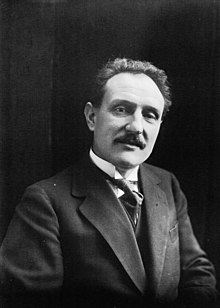Camille Chautemps
| Camille Chautemps | |
|---|---|
 |
|
| 68th Prime Minister of France | |
|
In office 21 February 1930 – 2 March 1930 |
|
| Preceded by | André Tardieu |
| Succeeded by | André Tardieu |
|
In office 26 November 1933 – 30 January 1934 |
|
| Preceded by | Albert Sarraut |
| Succeeded by | Édouard Daladier |
|
In office 22 June 1937 – 13 March 1938 |
|
| Preceded by | Léon Blum |
| Succeeded by | Léon Blum |
| Personal details | |
| Born | 1 February 1885 Paris, France |
| Died | 1 July 1963 (aged 78) Washington, D.C., United States |
| Political party | Radical |
Camille Chautemps (1 February 1885 – 1 July 1963) was a French Radical politician of the Third Republic, three times President of the Council (Prime Minister).
Described as "intellectually bereft", Chautemps nevertheless entered politics and became Mayor of Tours in 1912, and a Radical deputy in 1919. Between 1924 and 1926, he served in the centre-left coalition governments of Édouard Herriot, Paul Painlevé and Aristide Briand.
Initiated as a Freemason in 1906 in "les Demophines" lodge of Grand Orient of France, he became master in 1908, Worshipful Master of his lodge in 1910 and reached the 30th degree in Scottish Rite during 1924. He quitted Freemasonry in 1938 for political reasons.
He became President of the Council briefly in 1930. Again in centre-left governments in 1932 to 1934, he served as Interior Minister and became Prime Minister again in November 1933. His government fell, and he resigned his posts on 27 January 1934 as a result of the corruption exposed by the Stavisky Affair, when the press accused him of having Stavisky murdered to silence him.
In Léon Blum's Popular Front government of 1936, Chautemps was a Minister of State and then succeeded Blum at the head of the government from June 1937 to March 1938. The franc was devalued, but government finances remained in a mess. Pursuing the program of the Popular Front, he proceeded in the nationalisation of the railroads to create the SNCF. However, in January 1938, he drove the Socialists out of his government. In February, he granted married women financial and legal independence (until then, wives had been dependent on their husbands to take action involving family finances) and alloweed them to go to university and open bank accounts. His government also repealed Article 213 of the code: "the husband owes protection to his wife, the wife obedience to the husband" However, the husband remained "head of the household" with "the right to choose the household’s place of residence". His government fell on 10 March.
...
Wikipedia
